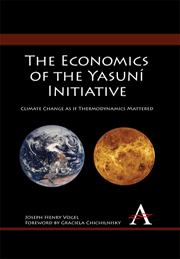Book contents
- Frontmatter
- Contents
- Prologue
- Foreword
- Introduction
- Acknowledgements
- Abbreviations and Acronyms
- The Economics of the Yasuní Initiative
- Chapter 1 Thermodynamics
- Chapter 2 The Tragedy of the Commons
- Chapter 3 The Willful Ignorance of Realpolitik
- Chapter 4 The General Theory of Second Best
- Chapter 5 Through the Bottleneck of a Cowboy Economy
- Conclusions
- Appendix: Annotated YouTube Filmography
- Ordering
- Notes
- Index
Chapter 5 - Through the Bottleneck of a Cowboy Economy
Financing Shovel-ready Projects
Published online by Cambridge University Press: 05 March 2012
- Frontmatter
- Contents
- Prologue
- Foreword
- Introduction
- Acknowledgements
- Abbreviations and Acronyms
- The Economics of the Yasuní Initiative
- Chapter 1 Thermodynamics
- Chapter 2 The Tragedy of the Commons
- Chapter 3 The Willful Ignorance of Realpolitik
- Chapter 4 The General Theory of Second Best
- Chapter 5 Through the Bottleneck of a Cowboy Economy
- Conclusions
- Appendix: Annotated YouTube Filmography
- Ordering
- Notes
- Index
Summary
Theory does not happen in a vacuum. Economists will think of John Maynard Keynes and the Great Depression. Keynes observed that markets do not always clear as economics had long taught. For example, one third of US labor force was effectively without work in the 1930s. Rather than prices, quantities adjusted and the economy settled into an unemployment equilibrium. By incorporating that observation into theory, macroeconomics emerged. Today, more reason exists than ever to believe that theory cannot happen in a vacuum. According to Stern, climate fluctuations may wreak havoc on the scale of the Great Depression and the wars of the first half of the twentieth century combined. Will a new macro-macroeconomics emerge? The crux of my argument is that it has already emerged. By the mid-1970s, a new macromacroeconomics could be gleaned in the economics of Boulding, Georegescu-Roegen, Schumacher, and Daly, and the science of Carson, Ehrlich, Hardin, and Prigogine. Ten years is a reasonable lag for putting into practice the synthesis. Had the political establishment acted by the mid-1980s, Stern's example of “climate change” as “market failure… on the greatest scale the world has seen” would have been largely mitigated or even averted.
Incorporation of the second law of thermodynamics into economics is the necessary condition to address climate fluctuations but it is not sufficient. One must also understand how institutions work and collective decisions are taken. In the language of thermodynamics, institutions define the boundary conditions while the decisions taken become points of bifurcation in pathways of success or failure.
- Type
- Chapter
- Information
- The Economics of the Yasuní InitiativeClimate Change as if Thermodynamics Mattered, pp. 53 - 70Publisher: Anthem PressPrint publication year: 2010



